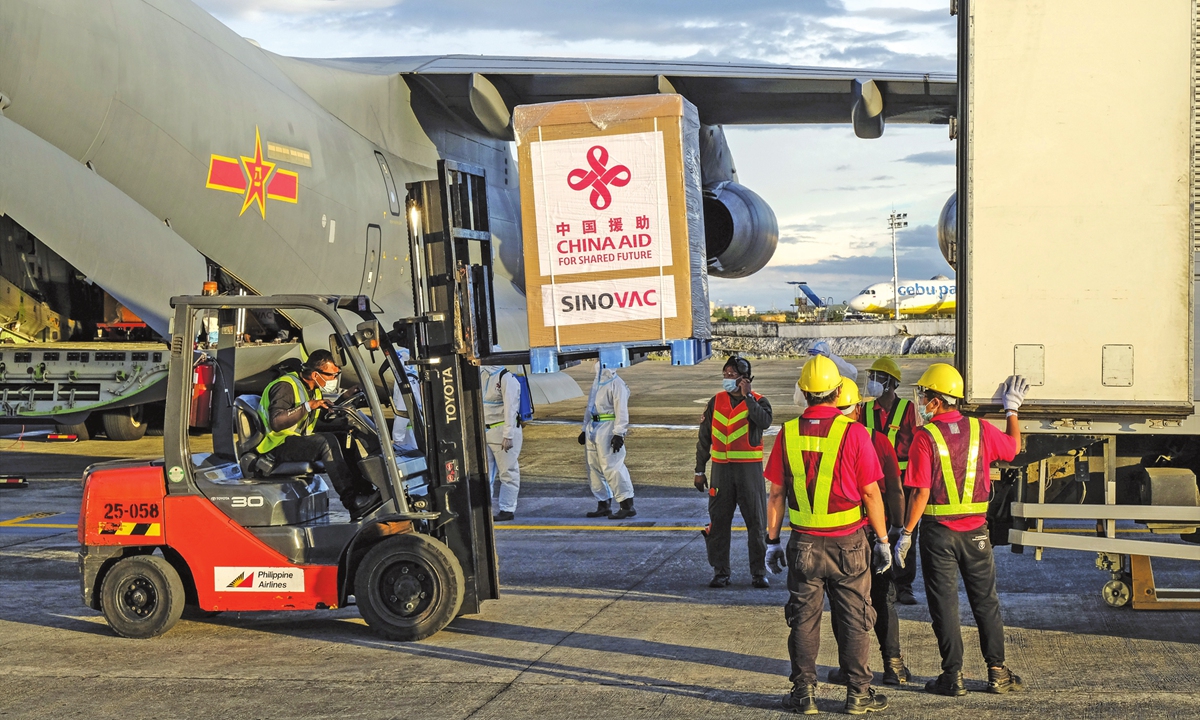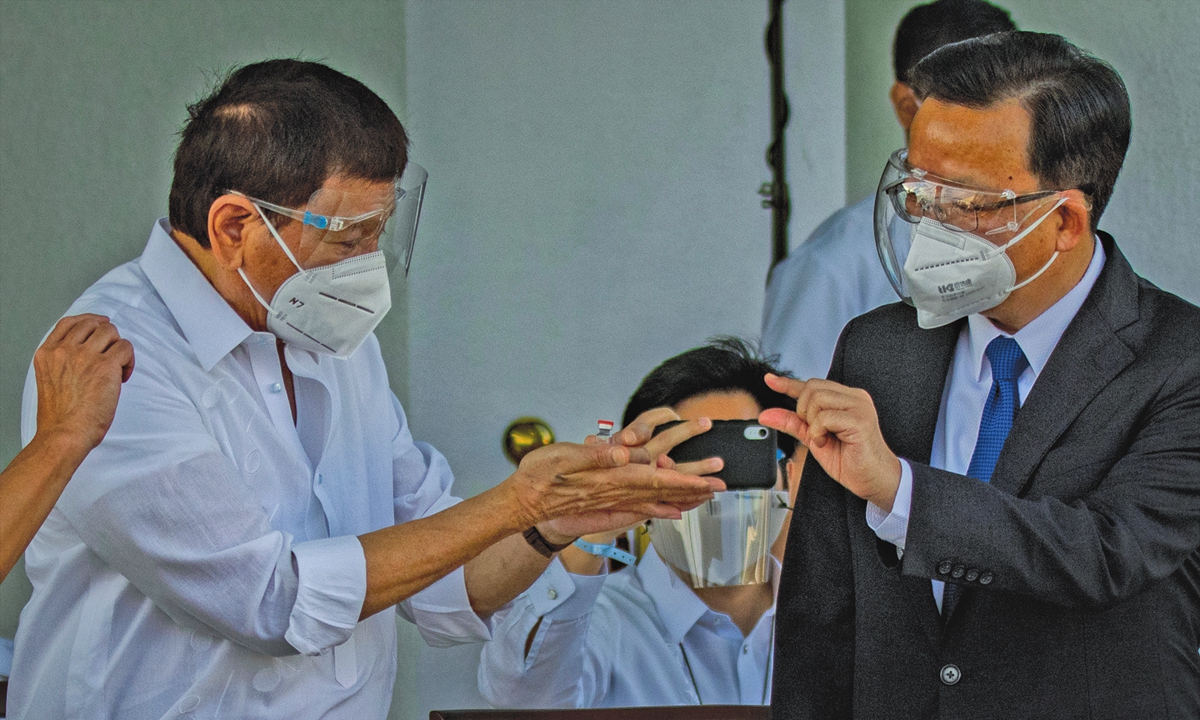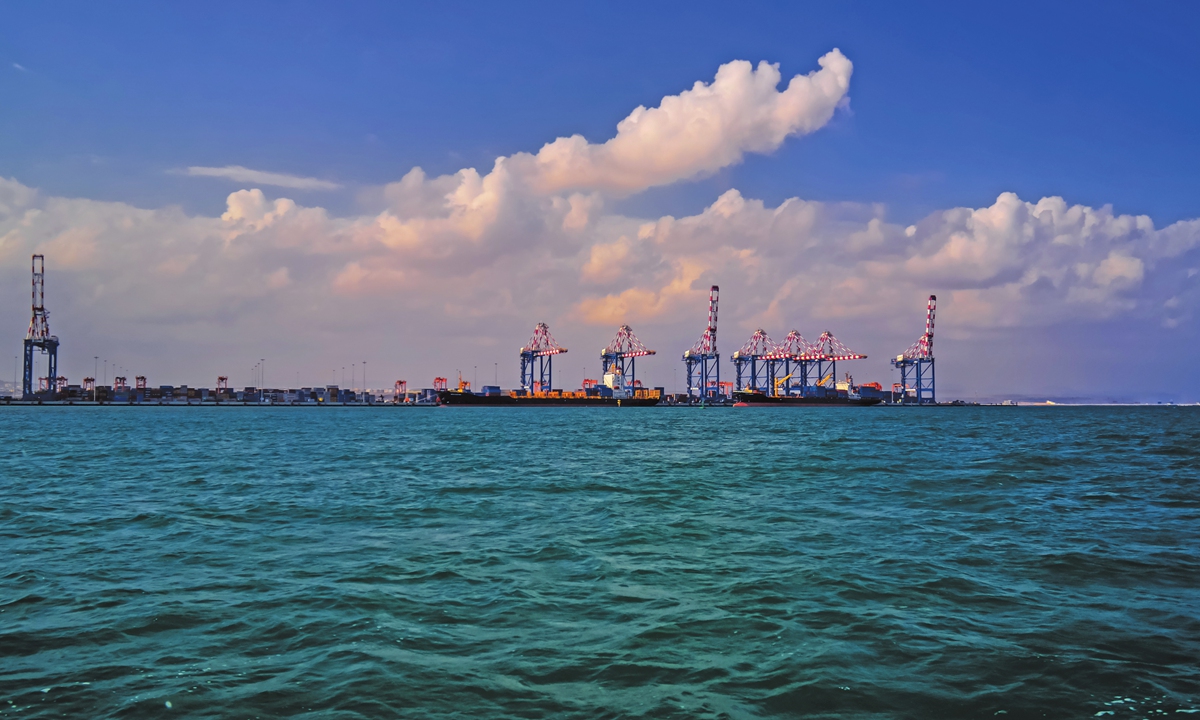Cold War mind-set will not work in post-COVID-19 world: experts

Ground crew load packages of the first shipment of Sinovac Biotech coronavirus vaccine onto a truck at the Villamor Airbase in Pasay City, Manila. Photo: VCG
Sun Ru, a research professor and deputy director of the Institute of World Political Studies, China Institutes of Contemporary International Relations, told the Global Times on Friday that Hal Brands, the author of these articles, indicated that the multi-dimensional modern competition is not only about military power and trade, but also internet norms and political concepts. The fight for the fulcrum country involves a variety of methods and spreads in many areas.
Meanwhile, the competition between China and the US is everywhere, and the pivotal countries are distributed all over the world.
US political wisdom
Dr Robert Lawrence Kuhn, chairman of The Kuhn Foundation and recipient of the China Reform Friendship Medal (2018), told the Global Times on March 7 that « to work our way out of this mutually debilitating stand-off will take wisdom from both US and China leadership. »
« Anxiety among US scholars is the product of the international positions and policies of the Trump Administration combined with international trends, especially the rise of China, but also a resurgent Russia, hostile states of Iran and North Korea, and the broad trends of de-globalization and ethno-nationalism, » Kuhn said.
Meanwhile, US geopolitical and diplomatic thought leaders remain confident that the US can play a leadership role, but not a hegemonic role, in maintaining an international order of high standards and in safeguarding principles of freedom, he noted.
Political wisdom is needed urgently for avoiding further exacerbation and escalation, which would only harm both countries and the world as a whole, Kuhn said.
Analyzing the current status of China-US bilateral relations, he said that the good news is that the Biden administration is keeping US-China relations stable; bilateral relations are not getting worse. The bad news is that US-China relations are worse than at any time in recent memory. Resisting China is the one policy on which Democrats and Republicans agree, while they fight fiercely over everything else. American public opinion about China, and Chinese public opinion about America, are the worst since such surveys have been taken. The pandemic has poured gasoline on the fire.
Kuhn suggested that if they have the will Washington and Beijing can do much to move to de-escalate.
« When I give advice, I like to be balanced, even-handed. Some in the US believe wrongly that China must change its political system; this increases tensions and it is not proper. The US should not be in the business of dictating how China runs its internal affairs, » he said.
Some in China feel wrongly they must control all discourse about China, even beyond China’s borders – reacting strongly to every real or perceived criticism also increases tensions. China can have more confidence in its system and accomplishments, Kuhn noted.
« It is natural that when one is attacked, that one attacks back. But sometimes there are cleverer things to do. I have found that China’s epic story of eradicating all extreme poverty is the best way to show how China’s system is structured and functions, which works to undermine foreign biases. Similarly, China can discuss its internal problems – environmental, economic imbalances, social issues like birth rates and gender, financial debt – it disarms those who think China is always triumphal. Another example is China wrestling with contemporary issues of data privacy and problems of AI, such as displacing employment – the same issues that many countries face, » he said.
Germany’s alarm on danger
In the West, there are a lot of politicians, scholars and others, who think that the time since the Opium Wars in the 1840s can be seen as a « normal » time – with a « normal » role for the West as « leading » the world and China being an underdog, far behind and underdeveloped, Wolfram Adolphi, a German political scientist, who has researched Chinese politics for almost 40 years, told the Global Times on March 10 in a written interview.
From his point of view, such so-called normal is assumed as « eternal » by these politicians and scholars. Meanwhile in the past 40 years, that normal status has changed.
« And it changes so quickly and so fundamentally that the West is challenged to readjust its whole understanding of the world, » Adolphi wrote.
« Now, China, the old world power, is back. This is unique in World history. But it’s normal: A country with a population of 1.4 billion people comes back to the place in the world it belongs to, » he said.
Adolphi said he deeply deplores that « there are so many voices in the US and the West in general who support the other option, which is full of danger » of provocation, war, of losing time in the search for new environmental policies, danger of using all the wonderful results of digitalization for war purposes.
« I’m always surprised that there is only a very shortsighted understanding of history, » Adolphi said.

China’s Ambassador to the Philippines Huang Xilian (right) gestures as Philippine President Rodrigo Duterte holds up a vial of Sinovac Biotech’s COVID-19 vaccine in Manila, the Philippines, on February 28. Photo: VCG
Philippines eyes China’s plan
Experts in the Philippines said that all countries in ASEAN refuse to pick a side between China and the US.
Bobby M. Tuazon, director of Policy Studies at the Center for People Empowerment in Governance of the Philippines, told the Global Times on Thursday that like many Southeast Asian countries and the whole of Asia, the Philippines expects China’s fast economic recovery to create a positive impact especially in the light of the signing of the Regional Comprehensive Economic Cooperation and Beijing’s launching of the 14th 5-year plan.
Analyzing the logic to enlist the Philippines as one of the flashpoints, Tuazon said that « for the past 120 years the Philippines has been used by the US as a strategic post for its economic expansionism and security objectives in the Asia Pacific. The US used its strong military presence in the Philippines to support its wars of intervention in the region including those in Korea, Indochina, and as far as the Persian Gulf. The US put the Philippines to good use in its military encirclement of China until today. »
Biden officials have communicated to Philippine defense authorities Washington’s intentions to preserve their defense alliance as « rock solid » with assurances to support the country’s territorial claims in the South China Sea and deter alleged Chinese provocations, he said.
Until this moment, however, the Duterte administration is keeping a balancing act with the US by suspending its threats to terminate the crucial Visiting Forces Agreement while not actively participating in US-led joint war exercises in the SCS so as not to harm the Philippine government’s strong economic ties with China, Tuazon said.
Talking about dealing with the pressure of choosing sides between the US and China, he said that « most countries in the [Asia Pacific] region desire peace and development and therefore treasure economic cooperation with China. This perspective has grown in the period of a pandemic with economic and political stability claiming a priority.
If the US wants to reclaim any leadership in the region it must choose economic cooperation over military competition. Under the Biden regime, the US faces a dilemma between promoting economic cooperation for which it can no longer compete with China and military interventionism for which it cannot attract reliable friends and allies either, Tuazon pointed out.
Wilson Lee Flores, a columnist for the English daily The Philippine Star, told the Global Times on March 10 that it is a sad mistake that this American analyst had said: « The Philippines is frontline state in South China Sea and a bellwether for US influence in critical subregion – Southeast Asia, » without fully accepting the new reality of President Rodrigo R. Duterte’s independent foreign policy of seeking to make the country not becoming militarily aligned to only one superpower.
« Our countries should not give in to any pressures to pick a side in the US versus China strategic competition, » Lee said.
Indian competition
This year marks the 70th anniversary of the establishment of diplomatic relations between China and India, and India’s security, political, and economic antagonism and even anti-China actions have suddenly cooled bilateral relations, the China Institute of International Studies (CIIS)’s newly released Blue Book on International Situation and China’s Foreign Affairs analyzed.
The CIIS is the think tank of China’s Ministry of Foreign Affairs.
The book analyzed that there are deep domestic and international political roots behind India’s adjustment of its China policy.
In the face of the downward trend in Sino-Indian relations, China has always maintained a calm and restrained attitude, maintaining a dialogue with India while strictly observing the bottom line, and actively seeking to improve bilateral relations.
The Indian side should meet China halfway, refrain from words and deeds, and jointly create an atmosphere and conditions for a turnaround in the relations between the two countries, the blue book suggested.
In her analysis, Sun, the professor from the China Institutes of Contemporary International Relations, finds that it might be difficult for China and India to get back to previous bilateral relations.
« After the China-India border disengaged, the tension began to ease, but I am afraid it will be difficult to return to the previous state. There is also competition among major powers between China and India, » she said.

A general view of Djibouti Photo: VCG
Djibouti knows its business
Djibouti Minister of Economy and Finance Ilyas Moussa Dawaleh told the Global Times on Friday that « the fact is, Djibouti and Djiboutians are striving to overcome poverty and develop to offer better living conditions to our Djiboutians fellows. A Cold War mind-set is counterproductive toward our aims and desire for better days. »
In the Bloomberg article, Djibouti is dubbed as the only nation to host both American and Chinese military bases is the bellwether of this superpower rivalry in Africa.
Asked if he foresees any possibility that Djibouti is turning into « an arena for rivalry » or a conflict stage due to military bases from the US, Japan, and China, Dawaleh said that « all of them are good friends of Djibouti and all are our valuable guests. And we sincerely encourage them to take advantage of this unique experience of being together and explore ways and means for more cooperation than competition. We are sincerely looking for much more positive outcomes in this unique experience. Trilateral cooperation must be experimented here in Djibouti. »
He is optimistic with the outlook to China-Djibouti partnership in development cooperation.
« We really found positives during the last decade. Even though I expected much more direct investments and job opportunities. We hope we will achieve more success in the future, » Dawaleh noted.
From his point of view, the top initiatives for Djibouti to recover from the global pandemic include a full overhaul of the Health System, digitalization of Djibouti, access to quality public services, and universal access to national broadband.
« Create jobs opportunities for our youth [is] very important to develop technical and vocational training centers for digital skills, » he said.
While in the Bloomberg article, concern about excessive borrowing from China is rising, Brands said.
« To be honest, we don’t pay attention to such irrelevant attacks and accusations, » Dawaleh said on his take to the opinion.
« We know what we are doing and how. We are not and we will not get involved in this superpowers’ competition. We just need genuine friends to help us in fighting against our No. 1 Enemy: Poverty. We need respect and support, » he stressed.

